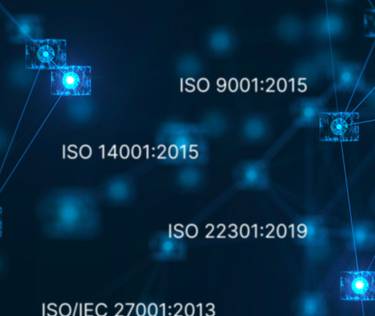ISO


What is ISO?
What exactly is ISO?
ISO is a non-governmental organization that develops quality and efficiency specifications for products, services, and systems. This organization's standards are valuable to international trade because they have strict requirements that goods must meet. Their ultimate goal is to improve global industrial welfare by increasing levels of safety and security for all.
Why are ISO certifications important?
Obtaining ISO quality management certification can pay huge dividends for your company in terms of increased efficiency, productivity, and customer satisfaction. However, the advantages of ISO extend far beyond your operations to every aspect of your company, including sales and marketing, strategic planning, and employee engagement.
ISO certifications, obtained from third parties, serve as proof that a company follows the International Organization for Standardization's standards. They give clients and other stakeholders confidence that a company operates efficiently and to a high standard. ISO certifications also demonstrate a company's dedication to important business goals such as customer satisfaction and production. Some public and private sector entities even require ISO certification before doing business with a company.
While ISO certification is important for businesses in all industries, it is especially important for IT companies. This is because IT companies deal with sensitive data, so taking adequate security measures is critical. Clients will feel more confident working with an ISO-certified IT company that they can rely on to keep their data secure while also providing high-quality services.
As a result, ISO certification is an excellent way for IT companies to demonstrate to clients that they are trustworthy and reliable, while also gaining a competitive advantage and opening up new business opportunities. Furthermore, becoming ISO certified provides numerous benefits to businesses, including:
- Increased efficiency improves business performance;
- Improved risk management through improved work processes;
- Increased security and data protection through the implementation of an efficient management system.
- Increasing customer satisfaction by meeting their needs;
- Improving the effectiveness of organizational internal processes;
- Continuous improvement of organizational processes by identifying and eliminating losses in activity implementation;
- Improving internal communications, the planning mechanism, and material resource distribution;
- Increasing staff motivation through transparency and clarity of work performed in a functional duty;
- Broadening staff knowledge in the field of quality;
- Lowering costs by increasing productivity, improving the quality of products manufactured, services provided, and lowering the level of deficiencies;
- Continuous improvement of the organization's activities through the use of modern quality management tools;
- Increased competitiveness in global markets.
Base58 and ISO standards?
ISO standards are classified into "families," or groups that focus on specific topics such as information security management or quality management. The ISO standards listed below are ones that we are proud to have and that have already had a significant impact on our business:
ISO 27001:2013 (Information Security Management Systems) is a management standard for information security that outlines the requirements for a strong information security management system (ISMS). It also defines processes for managing information security and privacy risks.
After becoming ISO 27001 certified you will be able to do the following:
- Keep records of data usage and protect data from unauthorized access or modification;
- Increase system security by identifying potential threats to your system and taking appropriate countermeasures;
- Improve your company's resilience and ensure that it can continue to operate efficiently in the event of a malicious attack or natural disaster.
ISO 22301:2019 (Business Continuity Management Systems) is the international standard for business continuity management systems (BCMS). It provides a framework for organizations to use in the face of various disruptions, such as cyber-attacks or natural disasters, to ensure the continued operation of their business.
After becoming ISO 22301 certified you will be able to do the following:
- Improve business continuity by identifying critical components, processes, and systems, as well as developing recovery strategies and putting them into action.
- By having a certified BCMS, you can demonstrate that you have taken precautions to protect your assets from disaster. This can help you improve your reputation and gain the trust of your clients.
- Ensure revenue and asset protection by putting procedures in place to quickly recover from incidents and minimize financial loss due to downtime or service disruption.
ISO 9001:2015 (Quality Management Systems) specifies the requirements for a quality management system that is both effective and robust (QMS). Its goal is to provide an effective QMS that will improve and monitor all aspects of the business. According to the International Organization for Standardization, there are over one million companies and organizations certified to ISO 9001 in over 170 countries.
After becoming ISO 9001 certified you will be able to do the following:
- Demonstrate your ability to provide regulatory-compliant products and services.
- Improve your quality management system to increase customer satisfaction.
- Increase employee morale by defining roles and responsibilities.
- Increase revenue by attracting new clients who are looking for a dependable partner.
- Processes should be measured and monitored to ensure consistent results.
ISO 14001:2015 (Environmental Management Systems) specifies how to design and implement an environmental management system (EMS) to improve an organization's environmental performance. The standard focuses on identifying, assessing, and managing environmental responsibilities while also ensuring legal compliance.
After becoming ISO 14001 certified you will be able to do the following:
- Show that you are meeting your environmental obligations by striving for continuous improvement.
- Reduce your negative environmental impacts while increasing your positive contributions.
- Improve your reputation by demonstrating your environmental stewardship.
- Be one step ahead of your competitors to gain a competitive advantage.
- Reduce waste and waste management costs by making better use of available resources.
What is the most effective method for obtaining ISO certification?
- ISO consulting services
Receive additional assistance by receiving guidance on a variety of practices such as regulatory compliance, employee onboarding, and risk management. - ISO certification training
Learn more about ISO standards, including their requirements, implementation, and the effects they would have on your organization's management systems. - CISOaaS - Chief Information Security Officer-as-a-service
On an as-needed basis, collaborate with an experienced chief information security officer. Gain access to industry knowledge to keep your data safe and security risks to a minimum, without making a long-term commitment. - Internal audits are performed
Increase performance by conducting internal audits to determine how well your organization's management systems are functioning and what needs to be improved. - Third-party audits
Ascertain that your organization's supplier meets all of the specific requirements outlined in your signed contract.
Conclusion:
ISO certification has provided us with numerous advantages, which we have discussed in this text. Of course, nothing happens overnight, so many hours of work, discussion, and research have gone into ISO certification to reap and enjoy the benefits of certification. Maja Ivosevic, our IMS manager and the person most responsible for certification, led the IMS team in the development of an ISO system that will be upgraded and improved over time, as improvement is critical for a reliable ISO system.













